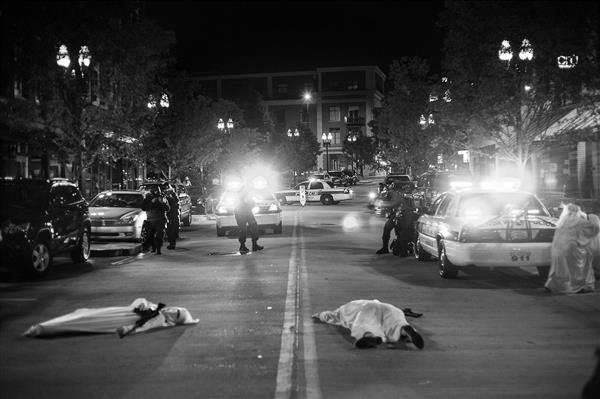

American Frenzy
Brandon Langley
Murfreesboro Pulse: How would you describe your film?
Langley: American Frenzy is a film that documents a real time event through a single seamless shot that spans multiple locations and multiple photographic mediums. Of course, it is actually many shots that were engineered to flow together using televisions, helicopters, and camera monitors as portals into different locations without breaking real-time constraints. I just wanted to make something different, something that I’ve never seen before. I thought that this continuously moving flow without any direct cuts might help to bring the viewers along for the ride rather than just being observers.
What challenges did you/your crew encounter while making the movie?
This film was originally created for the 2013 Knoxville 24 Hour Film Festival. So that was obviously a huge challenge to the production. We actually shot the entire film in 12 hours. From 1 p.m. to 1 a.m. That left us 12 hours to edit the picture. Well, it then took us almost every day for three months in post-production. So, needless to say, we didn’t complete it in time to be considered in the 24 Hour Festival. Working in an environment when you have only 12 hours to film something of this size causes many compromises. This film consists of probably 20 or so well planned shots with exact entry and exits points to link with the previous and next shots of the journey. We only had a couple of attempts at each shot because the setup time was high. However, I’m extremely proud of what we were able to do. The crew I was working with was extremely dedicated. And, even though on the surface the constraints of the shots seem silly without seeing the bigger picture, they trusted that it was all for a purpose.
How long have you been working in motion pictures?
Nine years ago, when I was 19 years old, I decided that I wanted to make a feature film. I had absolutely no experience and had never really shot anything with a camera before. I started talking to a young cinematographer/editor on the internet from Charlotte, NC. This was Andrew McGary. I have worked with him on every project since then, and I really owe everything to him. Andrew was itching to do something like this and so was I. I had a rather large story scribbled incoherently on napkins and scrap sheets of paper. Then, I just sat down and wrote the 126 page screenplay in 3 days and never even re-read any part of it until we were in production. I had no clue what I was doing or what I was in for, but I sent this out to actors in the southeast and was able to get talent from three different states who believed in the project and gave their time completely for free. Looking back on this, I really can’t believe how lucky I was, and I am extremely gracious to these people. Andrew and I shot and edited this thing over the course of about a year and a half as a two man crew. We started Mistakist Productions, and since then we have been working together mostly on short films and music videos. You can check some of that stuff out and contact us on mistakist.com.
In the process of film-making, how much of the creativity is found in production? How much improvisation do you find on set?
It is truthfully different for every project. I have worked in an improvisational manner in the past. The actual camera work and techniques are usually planned. Andrew and I sometimes do animated pre-vis to figure out issues we might run into before the production actually begins. This has saved a lot of headaches in the past. I do like to work with dialogue in an improvisational manner because I think that the things that the actors can develop on the spot, when they are in that moment, will probably feel much more honest than if they were just reciting lines that I wrote word for word. I try to not to be very precocious at all about written dialogue and just go with what feels right at the time. This also lends itself toward the way I like to shoot films which is definitely not complete coverage of every scene from many angles, but rather just to shoot segments that have hinge pieces. These segments from point A to point B are usually already decided before we film and as long we hit the hinge pieces, and have a bit of crossover wiggle room for the edit, then as much creativity as possible can happen on set during those body pieces. I actually really hate shooting full coverage. I feel it slows all of the momentum down and isn’t always respectful to the actors’ improvisational moments. Of course, most people disagree with this.
What attracted you to the medium of film?
I was just a big fan of good movies, like every other filmmaker. I became very attracted to work that felt new and stimulating, because it was different than things I had seen before. I realized that I really wanted to try to do this too. I wanted to make things that would not exist if I didn’t make them, and I wanted to try to evoke some kind of feeling through this medium. I’m still trying to accomplish this.
What would you say of the place motion pictures have in our culture?
This is probably best answered in a true story. Once, on travel to Colorado, I met a beautiful nun inside a Burger King. She was eating two Jr. Whoppers rather than one normal sized Whopper. She beckoned me to her side and asked me about my goals. I was lost and didn’t know where to go, and she told me of her band of seven misfit pet squirrels. She explained that late at night on the weekends, she would play Sam Cooke songs at the wrong rpm and have them perform circus tricks. She recounted that they practiced for months and months until a premiere performance was scheduled for all of her sisters to come watch the circus musical. Everything went as planned—except for one small hitch when the tune “You Send Me” began to play . . .
What makes a great movie? What elements do you think an audience should look to appreciate?
I suppose it’s different for everyone.
If you could change one thing about the process, what would it be?
If this is about the process of making my own films, then the answer would definitely be that I would like to have had more time during actual production. Most of my projects have been for tightly timed competitions recently, and I always feel a strong sense of compromise after each shoot because we have been forced to film everything in one day. This process has lent itself towards a great abundance of pre-planning and only one or two takes per shot and much less time towards actual on-set creativity. The project that I do next will not be for a time competition, and I hope to take advantage of having more production time.
How did you learn your craft?
I don’t know much, but I learned everything that I do know from trial and error. Mostly from making mistakes and then correcting those mistakes the next time. There probably is no such thing as a true mistake. The biggest learning experience I ever could have had was in my first project—a 2-plus-hour feature film—when I was 19 years old. This was as shoestring as it got and everything was held together by duct tape. I wouldn’t change a single thing about that experience.
What themes do you like to explore in film?
Well, the truth is that I have never and probably will never make anything that starts from a “point.” What I mean by this is that I have no desire to make a point or a message with any project that I do. It’s probably easier to leave the preaching up to the politicians. I like to ask questions, I suppose. Also, every project that I have done starts simply with a mood, a feeling, an emotion. I really focus on trying to convey a certain and specific mood, rather than trying to hammer a point into people’s brains. If people can feel something, anything, from a work I devote time to, then I feel like I have accomplished what I set out to do.
What inspires/influences you?
Anything that gives me a strong visceral response. Sometimes it may be YouTube videos or photography, but recently it’s mostly been music. I would say that the starting point of all of my recent projects has been a feeling accidentally captured while listening to music or looking at a picture.
Are there any particular genres you favor over others?
No.
In terms of motion picture production, what would you like to see from the state of Tennessee? What advantages does the state currently have, and how do you think it could improve?
I have no idea. I’m not really qualified to talk about such things and try to stay out of the politics. So far, I’ve just really dreamed up things, and have been lucky enough to work with people talented enough to help realize these ideas out of pocket. I haven’t dealt with any red tape issues or anything so far.
On what projects are you currently working?
Well, I’ve got something in the works that Andrew and I have been planning for many months. I probably shouldn’t say too much about it right now. Of course, it’s very technically challenging and the people involved with the technical aspects will probably hate me for it. But I think it could be very rewarding. Unfortunately, many times—and especially with a project like this—things are governed by money. I can’t really afford to pay for this one out of pocket like my other projects, so I have to figure that situation out.
What advice do you have to aspiring filmmakers?
I’m not really in a position to give advice to anyone. I’m still learning things every time I attempt something like everyone else. And, I know that everyone has their own tastes and goals for what they want to do with each project they work on. But, if I was forced to answer this, I would probably just say, ‘don’t hold back.’ Everyone can dream big, but most of the time they only whittle away from their dreams until the thing that is left is just a normal wooden baseball bat and nothing more. Just make something that will attack people. Don’t worry about making something to please everyone, but do worry about making something that you have never seen before. Make something that could not have existed in any way whatsoever if you were not born, something unique. Find a new way to tell a story.
What do you see for the future of storytelling through motion pictures?
Hopefully some good stuff . . .













